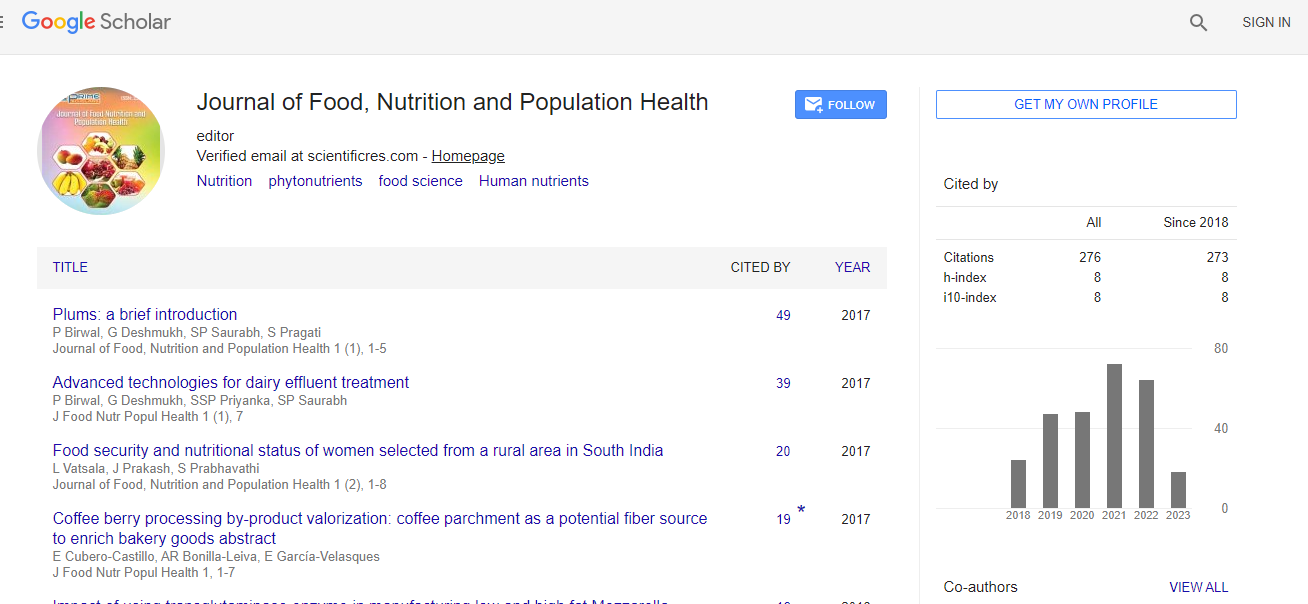Commentary - (2024) Volume 8, Issue 4
The Role of Gut Microbiota in Nutrition and Disease Prevention
Khadijeh Mirzaei*
Department of Science and Research, Islamic Azad University, Iran
*Correspondence:
Khadijeh Mirzaei,
Department of Science and Research, Islamic Azad University,
Iran,
Email:
Received: 02-Dec-2024, Manuscript No. ipjfnph-25-22477;
Editor assigned: 04-Dec-2024, Pre QC No. ipjfnph-25-22477 (PQ);
Reviewed: 18-Dec-2024, QC No. ipjfnph-25-22477;
Revised: 23-Dec-2024, Manuscript No. ipjfnph-25-22477 (R);
Published:
30-Dec-2024, DOI: 10.21767/2577-0586.8.4.34
Description
The human gut is home to trillions of microorganisms,
collectively known as the gut microbiota. These bacteria,
fungi, viruses, and other microbes play a crucial role in
digestion, immune function, and overall health. In recent years,
scientific research has highlighted the profound impact of gut
microbiota on nutrition and disease prevention. A balanced
gut microbiome supports nutrient absorption, protects against
infections, and reduces the risk of chronic diseases such as
obesity, diabetes, and inflammatory disorders. This article
explores the significance of gut microbiota in nutrition and
its role in preventing diseases. The gut microbiota consists
of diverse microbial communities that reside primarily in the
intestines. The composition of these microbes is influenced by
genetics, diet, environment, and lifestyle. Beneficial bacteria,
such as Lactobacillus and Bifidobacterium, contribute to
health, while an imbalance in gut flora (dysbiosis) is associated
with various diseases. Gut bacteria help break down complex
carbohydrates, fiber, and proteins that the body cannot digest
on its own. Fermentation of dietary fiber by gut microbes
produces SCFAs, which serve as an energy source for intestinal
cells and contribute to metabolic health. Research indicates
that the gut microbiota influences metabolism and body
weight. A balanced microbiome promotes efficient energy
utilization, while dysbiosis has been linked to obesity and
metabolic disorders. Some bacteria extract more energy from
food, increasing the risk of weight gain, while others enhance
fat breakdown and reduce inflammation. An imbalance in gut
bacteria can contribute to obesity by promoting fat storage
and increasing inflammation. Studies have shown that people
with obesity often have lower microbial diversity in their gut.
A diet rich in fiber, probiotics, and prebiotics can help restore
a healthy gut balance and prevent weight-related issues.
Gut microbiota influences insulin sensitivity and glucose
metabolism. Certain bacteria, like Akkermansia muciniphila,
have been associated with improved insulin function and lower
risk of type 2 diabetes. Diets high in fiber and fermented foods
can enhance microbial diversity, reducing the risk of diabetes.
Some gut bacteria produce metabolites that influence heart
health. For instance, an unhealthy microbiome can generate
excessive trimethylamine N-oxide, which is linked to an
increased risk of heart disease. Eating a plant-based diet rich
in fiber and polyphenols can promote heart-healthy gut
bacteria. The gut microbiome communicates with the brain
through the gut-brain axis, influencing mood, stress response,
and cognitive function. An imbalance in gut bacteria has been
linked to depression, anxiety, and neurodegenerative diseases.
Consuming probiotics and fermented foods can support mental
well-being by enhancing beneficial gut bacteria. A healthy
gut microbiota strengthens the immune system by regulating
inflammatory responses. Beneficial bacteria help prevent
infections by outcompeting harmful pathogens and modulating
immune cell activity. Dysbiosis is associated with autoimmune
diseases, such as Inflammatory Bowel Disease (IBD) and
rheumatoid arthritis. The gut microbiota plays a crucial role
in nutrition and disease prevention. A healthy gut contributes
to digestion, metabolism, immune function, and mental wellbeing,
while an imbalanced microbiome increases the risk of
chronic diseases. Maintaining gut health through a balanced
diet, probiotics, and lifestyle modifications is essential for
overall well-being. As research continues to uncover the links
between gut microbiota and health, incorporating gut-friendly
dietary habits can lead to long-term benefits for individuals
and public health.
Acknowledgement
None.
Conflict Of Interest
The author declares there is no conflict of interest in publishing
this article
Citation: Mirzaei K (2024) The Role of Gut Microbiota in Nutrition and Disease Prevention. J Food Nutr Popul Health. 8:34.
Copyright: © 2024 Mirzaei K. This is an open-access article distributed under the terms of the Creative Commons Attribution License, which permits unrestricted use, distribution, and reproduction in any medium, provided the original author and source are credited.

